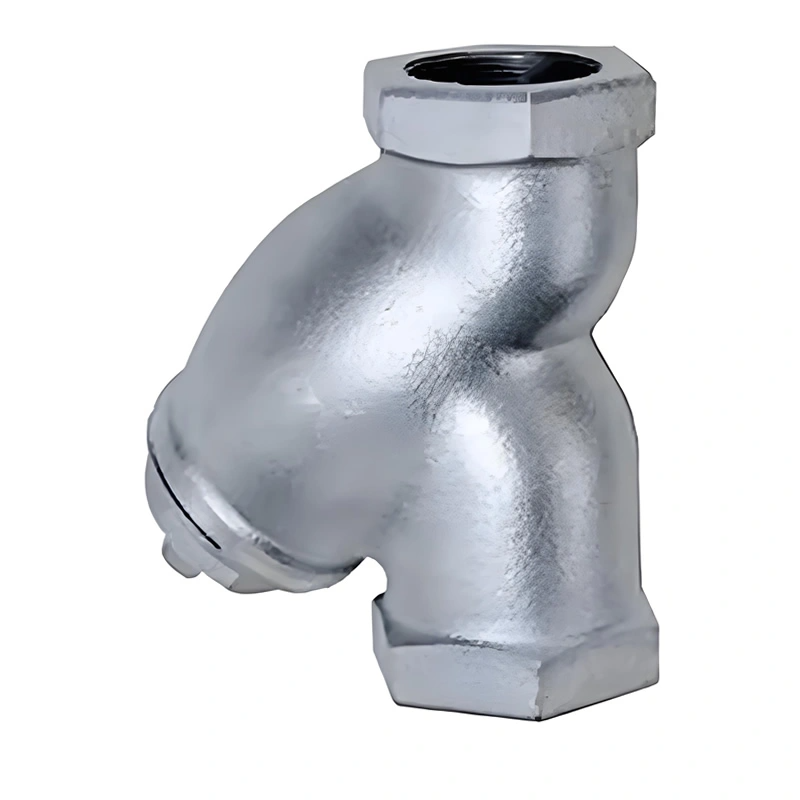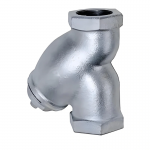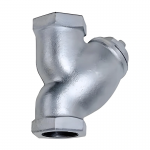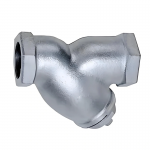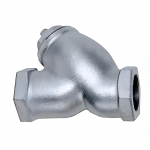Specification
TIANYU Ductile Iron Y-Type Strainer with Non-Asbestos Gasket: Reliable Filtration for Industrial Fluid Systems
I. Product Overview
II. Key Attribute Parameters
-
Specifications & Dimensions:
- Port diameter: DN15-DN50 (equivalent to 1/2″~2″), covering small to medium pipeline filtration needs;
- Structural dimensions: For DN25 (1″), overall length is approximately 160mm, and flange outer diameter adapts to JIS10K standards (around 115mm), with specific dimensions adjusted based on connection standards.
-
Connection Standards:
- Flange connection: Compatible with JIS10K, JIS20K, ANSI150, ANSI300, and PN16/PN25 standards, with a raised face (RF) sealing surface, meeting the docking needs of industrial pipeline systems in different regions;
- Threaded connection (optional): Supports NPT, BSPT, DIN259, etc., suitable for small to medium equipment interfaces.
-
Material Properties:
- Body material: FCD 450 ductile iron, with tensile strength ≥450MPa and elongation ≥10%. Its toughness is over 3 times that of ordinary gray cast iron, with excellent impact resistance and vibration resistance;
- Key components: Filter mesh is stainless steel (304 material) with 20-mesh precision (adjustable as needed) for stable interception efficiency; gaskets are non-asbestos, resistant to high temperatures and media erosion, ensuring reliable sealing performance.
-
Operating Parameters:
- Working pressure: PN16 (1.6MPa), PN25 (2.5MPa), suitable for medium-pressure industrial systems;
- Medium temperature: Normal temperature (-10℃~80℃), suitable for non-high-temperature media filtration;
- Applicable media: Industrial water, hydraulic oil, compressed air, light oils, and other non-strongly corrosive media.
-
Standards & Certifications:
- Complies with ISO9001 quality management system and CE certification;
- Testing standard: Pressure testing and functional inspection in accordance with API 598;
- Warranty: 12 months (from the date of delivery).
Product Overview
III. Structural Features and Design Advantages
-
Efficient Filtration and Low Resistance:
The Y-shaped flow channel design creates a gentle 涡流 (vortex) when media flows through, with impurities trapped at the bottom of the filter mesh by both gravity and centrifugal force. Filtration efficiency is 15% higher than straight cylindrical strainers; the inner wall of the flow channel is smooth, with a local resistance coefficient ≤3.0, reducing system pressure loss and energy consumption. -
Material Durability:
FCD 450 ductile iron undergoes isothermal quenching, combining high strength with good toughness. It is less likely to crack under vibrating conditions (such as hydraulic pump outlets), with a service life over twice that of ordinary cast iron strainers; the stainless steel mesh is rust-resistant and can be repeatedly cleaned for reuse, reducing consumable costs. -
Sealing Reliability:
Non-asbestos gaskets contain no asbestos, meeting environmental requirements, and can maintain stable sealing under PN25 pressure to prevent media leakage; the gasket fits tightly with the flange surface, eliminating the need for over-tightening bolts during installation, reducing the risk of flange deformation. -
Multi-Standard Compatibility:
The same diameter can match multiple flange standards such as JIS, ANSI, and PN, allowing adaptation to pipeline systems in different regions without replacing the strainer body, especially suitable for multinational projects or imported equipment supporting. -
Convenient Maintenance:
The top features a threaded cover or flange cover design. After disassembly, the filter mesh can be directly removed for cleaning or replacement, with maintenance taking only 10 minutes (for standard models) without interrupting the entire pipeline system.
IV. Manufacturing Processes and Quality Control
-
Material Selection and Casting:
High-quality FCD 450 ductile iron ingots are selected, with chemical composition verified by spectral analysis (carbon equivalent 4.3~4.7%, silicon content 2.4~2.8%) to ensure mechanical properties meet standards; resin sand casting is used to reduce casting defects such as pores and shrinkage, with casting surface roughness ≤25μm. -
Precision Machining:
- Valve body flow channels and flange surfaces are machined by CNC lathes, with dimensional error ≤0.1mm to ensure smooth flow and connection tightness;
- Filter meshes are woven from stainless steel wires, stamped and formed, with edges fixed by laser welding to prevent falling off during use;
- Threaded interfaces (such as NPT/BSPT) are machined to DIN2999 standards, with complete thread profiles and reliable sealing.
-
Assembly and Testing:
- A torque wrench is used during assembly to control bolt preload, ensuring uniform force on the gasket;
- Each strainer undergoes: shell hydrostatic testing (1.5 times nominal pressure, 30-minute pressure holding without leakage); sealing testing (1.1 times nominal pressure, no bubble leakage); functional testing (simulating media flow to verify filtration efficiency).
-
Surface Treatment:
The ductile iron surface is sprayed with anti-rust paint (dry film thickness ≥60μm), passing a 300-hour salt spray test to adapt to humid industrial environments.
Valve Details
V. Core Product Advantages
-
Outstanding Material Cost-Effectiveness: FCD 450 ductile iron has strength close to cast steel but costs 20% less, balancing durability and economy, suitable for mass applications in small to medium industrial projects.
-
Environmental Protection and Compliance: Non-asbestos gaskets meet EU REACH regulations and international environmental standards, avoiding asbestos hazards, suitable for food and pharmaceutical auxiliary systems with strict environmental requirements.
-
Strong Standardized Adaptability: Multi-flange standard compatibility allows direct replacement of same-spec imported brand products, reducing pipeline modification costs, especially suitable for equipment upgrades or maintenance replacement scenarios.
-
Stable and Reliable Supply Chain: Relying on a mature production system, orders of 1-5 units can be delivered within 20 days, and 51-200 units within 60 days, with a 100% on-time delivery rate to meet the needs of urgent projects.
-
Low Maintenance Costs: The stainless steel mesh can be repeatedly cleaned, and non-asbestos gaskets are easy to replace, reducing lifecycle maintenance costs by 30% compared to similar products.
Application
VI. Application Fields and Scenarios
-
Hydraulic and Lubrication Systems:
- Injection molding machine hydraulic stations: Filter metal debris in hydraulic oil to protect servo valves and cylinders;
- Machine tool lubrication systems: Intercept impurities in lubricating oil to reduce guide rail and gear wear.
-
Cooling Circulation Systems:
- Central air conditioning cooling water pipelines: Filter sediment and algae in circulating water to prevent heat exchanger blockages;
- Industrial cooling towers: Intercept particles in make-up water pipelines to avoid spray nozzle blockages.
-
Municipal and Civil Fields:
- Community secondary water supply: Filter rust in municipal water to protect water meters and water heaters;
- Gas pressure regulating stations: Filter tiny particles in natural gas to prevent pressure regulator valve core jamming.
-
Light Industry Production:
- Food and beverage production lines: Filter impurities in cleaning water (with food-grade mesh) to meet hygiene requirements;
- Coating equipment: Filter oil mist and moisture in compressed air to ensure the quality of sprayed surfaces.
RELATED
-

High Temperature/Pressure 304 Stainless Steel Resistant Manual Power Forged Three Piece Flanged Floating Ball Valve
TIANYU 304 Stainless Steel Flanged Floating Ball Valve: Corrosion-Resistant Full-Port Flow Control Solution for Industrial, Sanitary, and Municipal Me…
BALL VALVE 11/03/2025 -

API ANSI 2in-16in DN50-DN400 PN10 PN16 CF8M Pneumatic Flanged Floating Ball Valve
TIANYU CF8M Pneumatic Flanged Floating Ball Valve: 2in-16in (DN50-DN400) PN10-PN16 API/ANSI Class Corrosion-Resistant Flow Control Solution for Indust…
BALL VALVE 11/01/2025 -

Large-Diameter DN1400 CLASS150 WCB SS Triple Eccentric Metal-Sealed Hard Seal Butterfly Valve
TIANYU DN1400 (56″) CLASS 150 WCB Hard Seal Butterfly Valve: Triple Eccentric Metal-Sealed Flanged Valve for Large-Diameter Industrial Media wit…
BUTTERFLY VALVE 10/30/2025 -

PN16 Stainless Steel Floating Ball Valve: Full Port 2PC Flange-Connected Valve with Fire-Safe & Anti-Static SS Ball Valve
TIANYU Stainless Steel Floating Ball Valve: Full Port 2PC Flange-Connected Valve with Fire-Safe & Anti-Static Design for Oil, Gas, and Industrial …
BALL VALVE 10/29/2025 -

High-Performance DN80 Class 150 WCB Soft-Sealed Lug-Type Double Eccentric Butterfly Valve
TIANYU 3” Class 150 WCB lug-type double eccentric butterfly valve is a technologically advanced flow control device engineered to address the challeng…
BUTTERFLY VALVE 10/25/2025 -

DN125 PN16 CF8M Stainless Steel Lug-Type Butterfly Valve with PTFE Lining Concentric Line Butterfly Valves
TIANYU DN125 PN16 CF8M stainless steel lug-type butterfly valve is a precision-engineered flow control device designed to address the challenges of ha…
BUTTERFLY VALVE 10/25/2025


